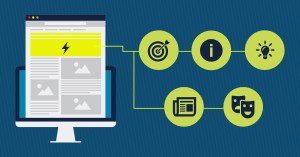When you write a piece of content, your first chance to impress a potential reader is with your headline. And while many people will read your headline, only 20% read the rest of your copy. With that reality in mind, you probably need to be spending more time on crafting your headline.
A tool from CoSchedule can help you get started. This tool analyzes your headlines based on word choice, length, and the type of headline: list, how to, generic, and more. Then, for the sake of your readers and your SEO, make sure there’s a keyword that lets your audience know exactly what the post is about.
There are more free tools online that help you write the best headline for each piece of content. You’ll also find a number of words you should and shouldn’t use. With dozens of best practices for headlines alone, it can be overwhelming. Check out the infographic below for help.

How to Write Powerful Headlines that
Demand Attention
- Your headline is your first impression you make on a prospective reader
- 80% of people will read your headline, but only 20% will read the rest
- Your headline has one purpose: to get the next sentence read
-
“On the average, five times as many people read the headline as read the body copy. When you have written your headline, you have spent eighty cents out of your dollar.” —David Ogilvy
Writing great headlines isn’t easy, but it’s important
The greatest copywriters say to spend half of the entire time it takes to create a piece of content on your headline
- Your headline needs to adhere to the SHINE principle
- Specific
- Helpful
- Immediately interesting
- Newsworthy
- Entertainining
-
CoSchedule’s Blog Post Headline Analyzer can help
- Analyzes word choice based on 4 categories
- Common words
- 20-30% of your headline
- For example: a, and, why, your
- Uncommon words
- 10-20% of your headline
- For example: awesome, more, year
- Emotional words
- 10-15% of your headline
- For example: danger, spotlight, wonderful
- Power words
- Use at least 1
- For example: in the world, you see, will make you
- Common words
- Analyzes word choice based on 4 categories
-
Shows you how the length of your headline
- Increases or decreases your click-through rate
- Affects how your headline shows up in SERPs
CoSchedule’s Analyzer Grades Your Headline’s Length
Choose your words wisely
- The Most Popular Words and Phrases in Highly-Shared Headlines
- Include a keyword
- Tell readers what the content is about
- Improve your SEO
- Use adjectives and power words
- Readers Prefer Headlines with Fewer Superlatives
- Some words evoke emotion more than others
- Emotion drives action
- Use the free Emotional Marketing value Headline Analyzer
- aminstitute.com/headline/index.htm
- Analyzes your headline to determine it’s Emotional Marketing Value (EMV) score
- Scored based on the total number of EMV words it has in relation to the total number of words it contains.
- Avoid the word “things” and use unique descriptors like
- Reasons
- Principles
- Facts
- Lessons
- Ideas
- Ways
- Secrets
- Tricks
Write specifically for your readers
- Reader Preferences of the Type of Headline
- Know your audience
- Know what kind of language appeals to them
- Write directly to specific people
- Understand how your readers are feeling when they read your post
- Answer questions and use
- What
- Why
- How
- When
- Why and how are trigger words that persuade or enable readers
- Make an audacious promise
- Promise readers something valuable
- Without over-promising, be bold
- Most importantly: Deliver what you promise
Conclusion
Your headlines—on blog posts, infographics, articles, landing pages, email campaigns, and other marketing collateral—are arguably the most important part of your copy. Spend the time to make your headline an attention-getter to give your content its highest chance for success


Share “How to Write Powerful Headlines that Demand Attention” On Your Site
| <p><strong>Click To Enlarge</strong><br /><br /> <a href=”https://www.salesforce.com/ca/blog/2016/04/write-headlines-that-demand-attention.html” _rte_href=”https://www.salesforce.com/ca/blog/2016/04/write-headlines-that-demand-attention.html” target=”_blank”> <img src=”https://www.salesforce.com/ca/blog/wp-content/uploads/sites/12/2023/10/How-to-Write-Powerful-Headlines-final.jpg” _rte_src=”https://www.salesforce.com/ca/blog/wp-content/uploads/sites/12/2023/10/How-to-Write-Powerful-Headlines-final.jpg” alt=”How to Write Powerful Headlines that Demand Attention” width=”600px” border=”0″ /> </a> </p> <p>Via <a href=”https://www.salesforce.com/ca/” _rte_href=”https://www.salesforce.com/ca/” target=”_blank”>Salesforce</a> </p> |

























